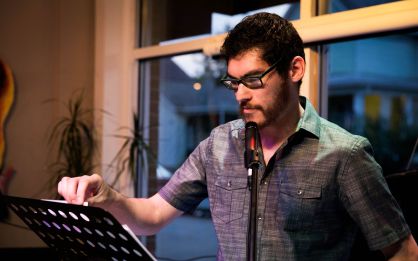The morning rain, when, from her coop released,
The hen, exulting, flaps her wings, when from
The balcony the husbandman looks forth,
And when the rising sun his trembling rays
Darts through the falling drops, against my roof
And windows gently beating, wakens me.
I rise, and grateful, bless the flying clouds,
The cheerful twitter of the early birds,
The smiling fields, and the refreshing air.
For I of you, unhappy city walls,
Enough have seen and known; where hatred still
Companion is to grief; and grieving still
I live, and so shall die, and that, how soon!
But here some pity Nature shows, though small,
Once in this spot to me so courteous!
Thou, too, O Nature, turn’st away thy gaze
From misery; thou, too, thy sympathy
Withholding from the suffering and the sad,
Dost homage pay to royal happiness.
No friend in heaven, on earth, the wretched hath,
No refuge, save his trusty dagger’s edge.
Sometimes I sit in perfect solitude,
Upon a hill, that overlooks a lake,
That is encircled quite with silent trees.
There, when the sun his mid-day course hath reached,
His tranquil face he in a mirror sees:
Nor grass nor leaf is shaken by the wind;
There is no ripple on the wave, no chirp
Of cricket, rustling wing of bird in bush,
Nor hum of butterfly; no motion, voice,
Or far or near, is either seen or heard.
Its shores are locked in quiet most profound;
So that myself, the world I quite forget,
As motionless I sit; my limbs appear
To lie dissolved, of breath and sense deprived;
As if, in immemorial rest, they seemed
Confounded with the silent scene around.
O love, O love, long since, thou from this breast
Hast flown, that was so warm, so ardent, once.
Misfortune in her cold and cruel grasp
Has held it fast, and it to ice has turned,
E’en in the flower of my youth. The time
I well recall, when thou this heart didst fill;
That sweet, irrevocable time it was,
When this unhappy scene of life unto
The ardent gaze of youth reveals itself,
Expands, and wears the smile of Paradise.
How throbs the heart within the boyish breast,
By virgin hope and fond desire impelled!
The wretched dupe for life’s hard work prepares,
As if it were a dance, or merry game.
But when _I_ first, O love, thy presence felt,
Misfortune had already crushed my life,
And these poor eyes with constant tears were filled.
Yet if, at times, upon the sun-lit slopes,
At silent dawn, or when, in broad noonday,
The roofs and hills and fields are shining bright,
I of some lonely maiden meet the gaze;
Or when, in silence of the summer night,
My wandering steps arresting, I before
The houses of the village pause, to gaze
Upon the lonely scene, and hear the voice,
So clear and cheerful, of the maiden, who,
Her ditty chanting, in her quiet room,
Her daily task protracts into the night,
Ah, then this stony heart will throb once more;
But soon, alas, its lethargy returns,
For all things sweet are strangers to this breast!
Belovèd moon, beneath whose tranquil rays
The hares dance in the groves, and at the dawn
The huntsman, vexed at heart, beholds the tracks
Confused and intricate, that from their forms
His steps mislead; hail, thou benignant Queen
Of Night! How unpropitious fall thy rays,
Among the cliffs and thickets, or within
Deserted buildings, on the gleaming steel
Of robber pale, who with attentive ear
Unto the distant noise of horses and
Of wheels, is listening, or the tramp of feet
Upon the silent road; then, suddenly,
With sound of arms, and hoarse, harsh voice, and look
Of death, the traveller’s heart doth chill,
Whom he half-dead, and naked, shortly leaves
Among the rocks. How unpropitious, too,
Is thy bright light along the city streets,
Unto the worthless paramour, who picks
His way, close to the walls, in anxious search
Of friendly shade, and halts, and dreads the sight
Of blazing lamps, and open balconies.
To evil spirits unpropitious still,
To _me_ thy face will ever seem benign,
Along these heights, where nought save smiling hills,
And spacious fields, thou offer’st to my view.
And yet it was my wayward custom once,
Though I was innocent, thy gracious ray
To chide, amid the haunts of men, whene’er
It would my face to them betray, and when
It would their faces unto me reveal.
Now will I, grateful, sing its constant praise,
When I behold thee, sailing through the clouds,
Or when, mild sovereign of the realms of air,
Thou lookest down on this, our vale of tears.
Me wilt thou oft behold, mute wanderer
Among the groves, along the verdant banks,
Or seated on the grass, content enough,
If heart and breath are left me, for a sigh!




 Sneha Subramanian Kanta
Sneha Subramanian Kanta Sneha Subramanian Kanta
Sneha Subramanian Kanta





